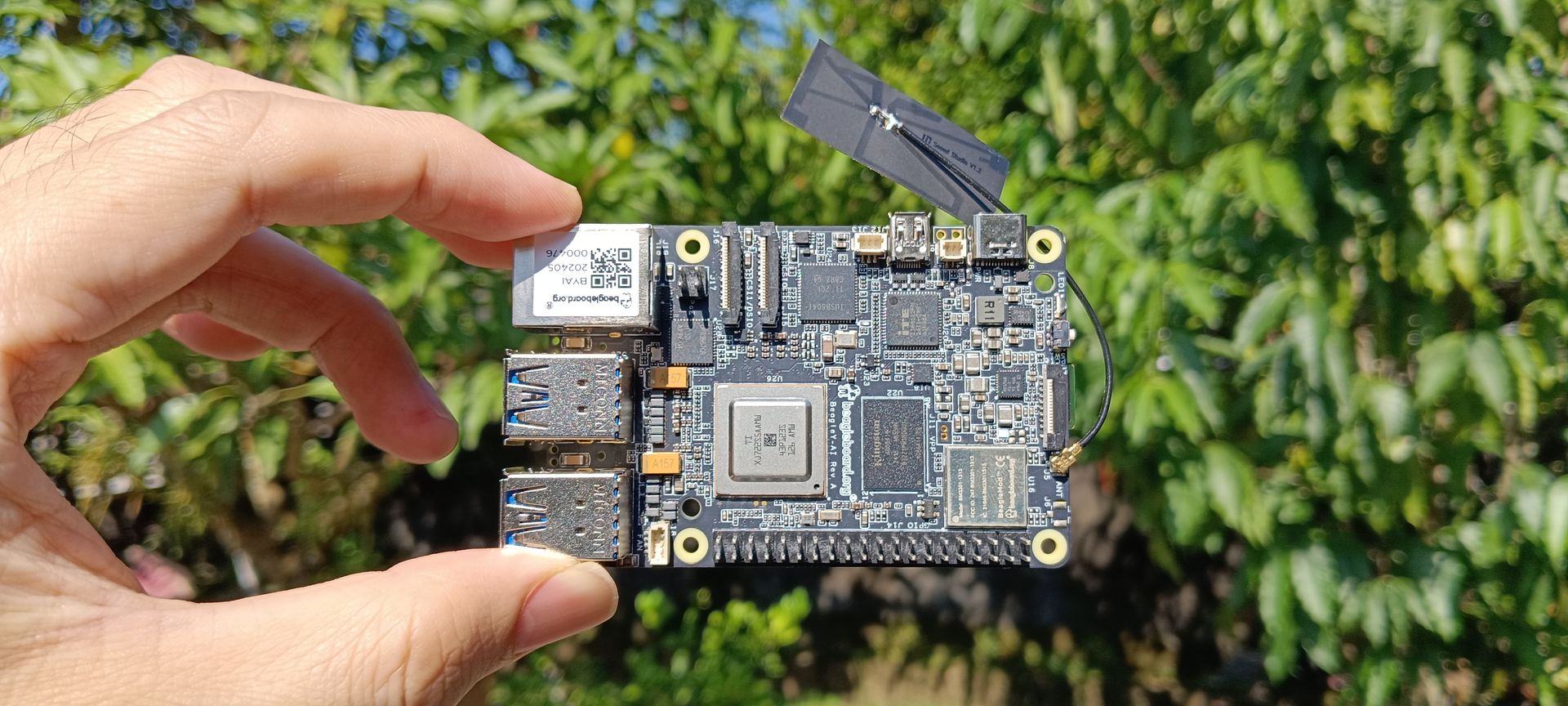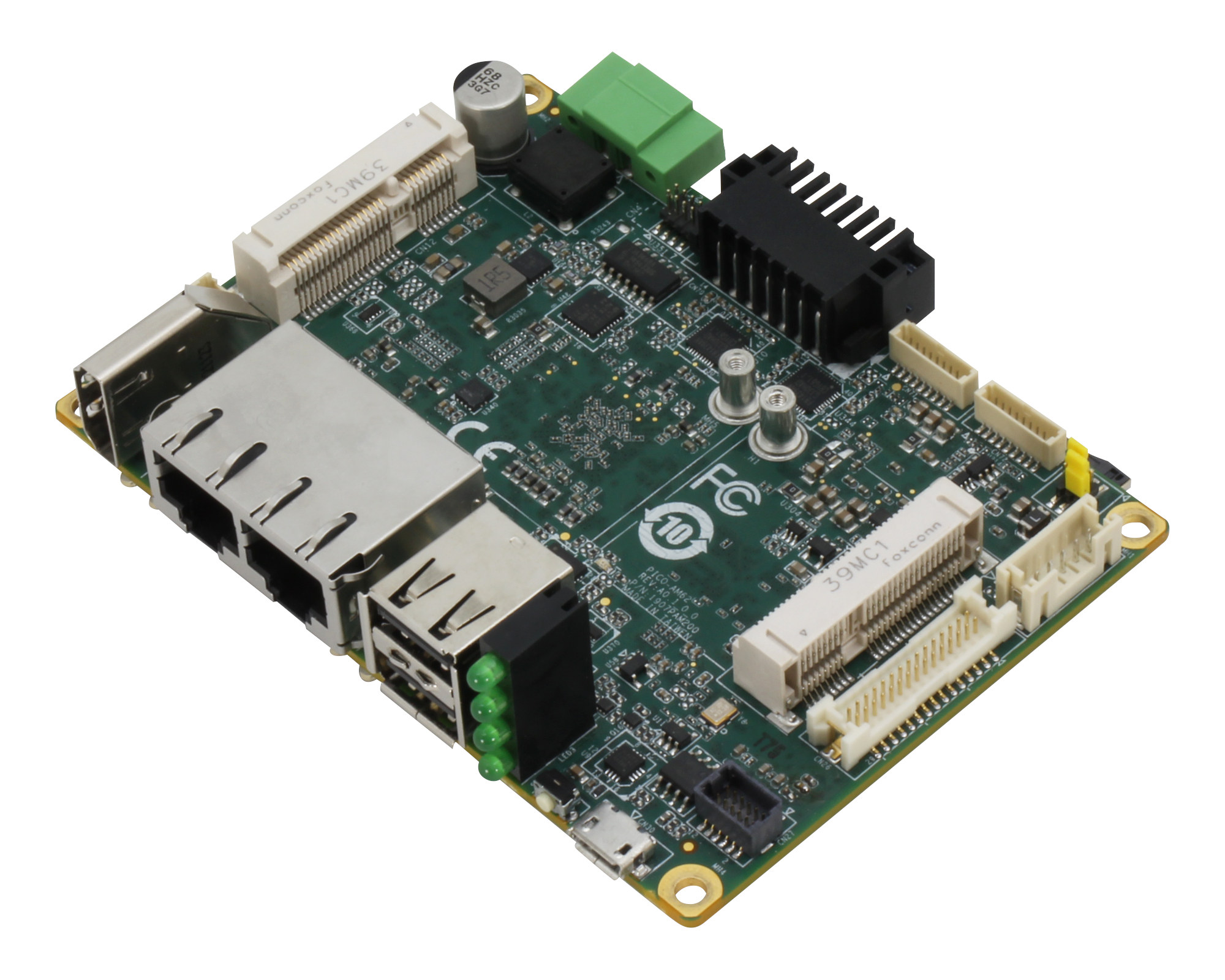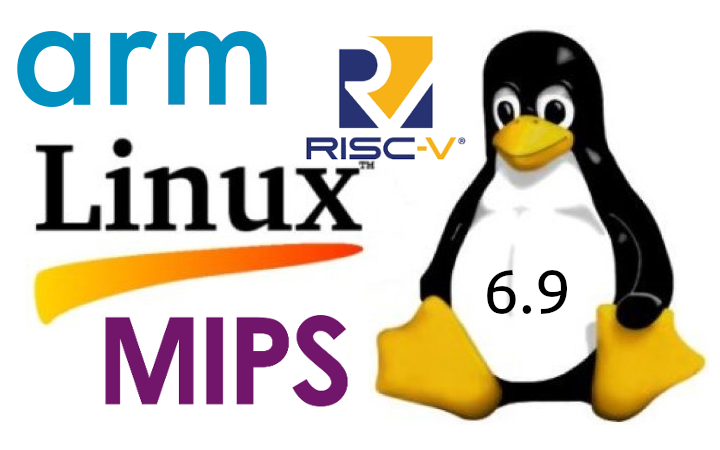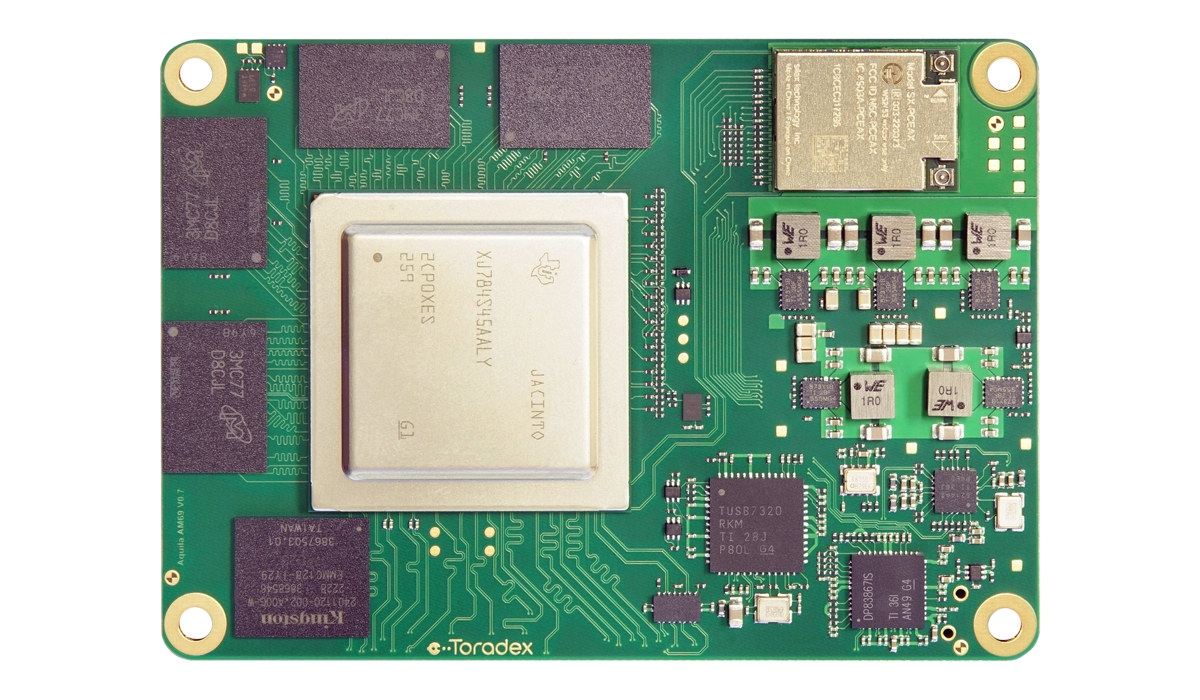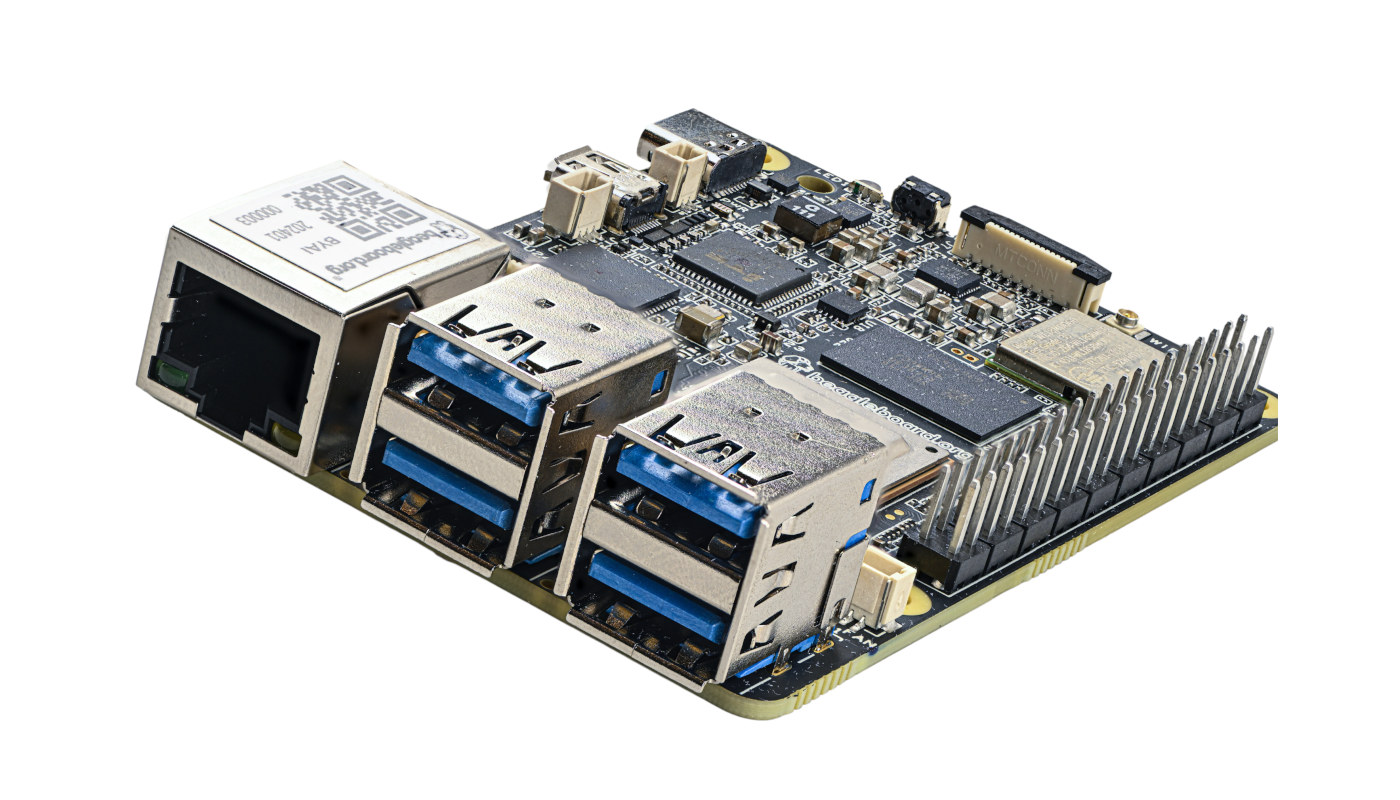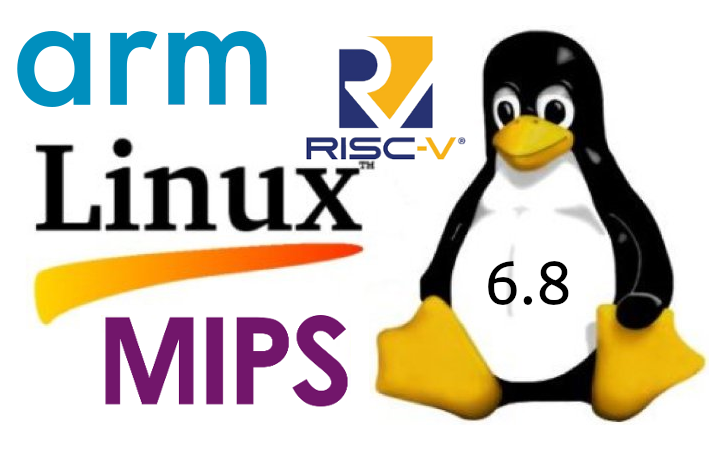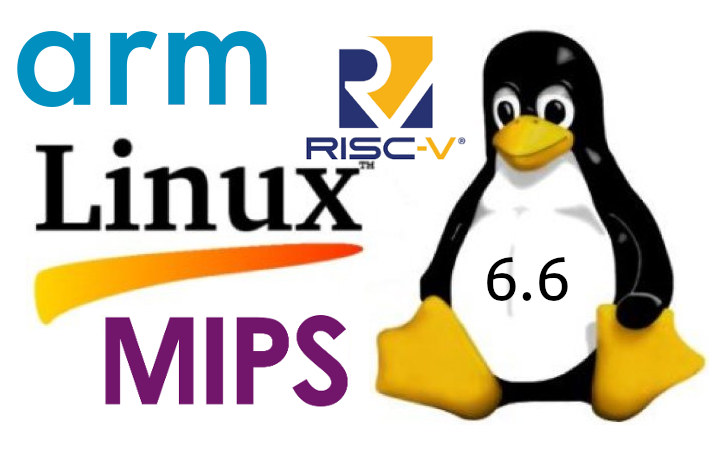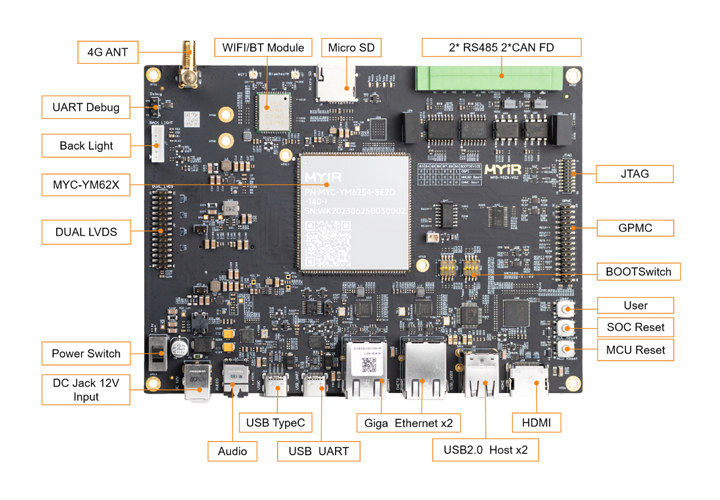Today I’ll be reviewing the BeagleY-AI open-source single-board computer (SBC) developed by BeagleBoard.org for artificial intelligence applications. It is powered by a Texas Instruments AM67A quad-core Cortex-A53 processor running at 1.4 GHz along with an ARM Cortex-R5F processor running at 800 MHz for handling general tasks and low-latency I/O operations. The SoC is also equipped with two C7x DSP units and a Matrix Multiply Accelerator (MMA) to enhance AI performance and accelerate deep learning tasks. Each C7x DSP delivers 2 TOPS, offering a total of up to 4 TOPS. Additionally, it includes an Imagination BXS-4-64 graphics accelerator that provides 50 GFlops of performance for multimedia tasks such as video encoding and decoding. For more information, refer to our previous article on CNX Software or visit the manufacturer’s website. BeagleY-AI unboxing The BeagleY-AI board was shipped from India in a glossy-coated, printed corrugated cardboard box. Inside, the board is protected by […]
Texas Instruments AM6232/AM6254-powered SBC and industrial IoT gateway offered with a 20-year lifespan
AAEON’s PICO-AM62 and SRG-AM62 are respectively a single board computer (SBC) and an industrial IoT gateway powered by Texas Instruments AM6232 or AM6254 Sitara Arm Cortex-A53/M4 SoC, designed to operate within the -40°C to 85°C temperature range, and offered with a 20-year lifespan. The SRG-AM62 gateway simply houses the PICO-AM62 pico-ITX SBC within a metal case so both offer dual gigabit Ethernet, HDMI 1.4 port, and two USB 2.0 as well as communication interfaces such as RS-232/422/485 and CAN Bus. Designed to be operated in industrial settings, the systems support a wide 9V to 36V input voltage range. PICO-AM62 SBC and SRG-AM62 gateway specifications: SoC – Texas Instruments AM623x either AM6232 Sitara with dual-core Arm Cortex-A53 processor @ up to 1.4 GHz, Cortex-M4F real-time core @ 400 MHz, no 3D GPU AM6254 Sitara with quad-core Arm Cortex-A53 processor @ up to 1.4 GHz, Cortex-M4F real-time core @ 400 MHz, Imagination […]
Linux 6.9 release – Main changes, Arm, RISC-V, and MIPS architectures
Linus Torvalds has just announced the release of Linux 6.9 on LKML: So Thorsten is still reporting a few regression fixes that haven’t made it to me yet, but none of them look big or worrisome enough to delay the release for another week. We’ll have to backport them when they get resolved and hit upstream. So 6.9 is now out, and last week has looked quite stable (and the whole release has felt pretty normal). Below is the shortlog for the last week, with the changes mostly being dominated by some driver updates (gpu and networking being the big ones, but “big” is still pretty small, and there’s various other driver noise in there too). Outside of drivers, it’s some filesystem fixes (bcachefs still stands out, but ksmbd shows up too), some late selftest fixes, and some core networking fixes. And I now have a more powerful arm64 machine […]
Toradex Aquila AM69 SoM features TI AM69A octa-core Cortex-A72 AI SoC, rugged 400 pin board-to-board connector
Toradex Aquila AM69 is the first system-on-module (SoM) from the company’s Aquila family with a small form factor and a rugged ~400-pin board-to-board connector targetting demanding edge AI applications in medical, industrial, and robotics fields with Arm platforms that deliver x86 level of performance at low power. The Aquila AM69 SoM is powered by a Texas Instruments AM69A octa-core Arm Cortex-A72 SoC with four accelerators delivering 32 TOPS of AI performance, up to 32GB LPDDR4, 128GB eMMC flash, built-in WiFi 6E and Bluetooth 5.3 module, and a board-to-board connector for display, camera, and audio interfaces, as well as dual gigabit Ethernet, multiple PCIe Gen3 and SerDes interfaces. All that in a form factor that’s only slightly bigger (86x60mm) than a business card or a Raspberry Pi 5. Toradex Aquila AM69 specifications: SoC – Texas Instruments AM69A Application processor – Up to 8x Arm Cortex-A72 cores at up to 2.0 GHz […]
BeagleY-AI SBC features TI AM67A vision processor with 4 TOPS AI accelerators
The BeagleBoard.org Foundation’s BeagleY-AI is an open-source hardware, credit card-sized SBC powered by a Texas Instruments AM67A quad-core Cortex-A53 vision processor with various programmable blocks capable of delivering up to 4 TOPS for AI algorithms. The board ships with 4GB RAM, relies on a microSD card slot for storage and OS booting, implements gigabit Ethernet, WiFi 6, and Bluetooth 5.4 connectivity, and can drive up to three displays via micro HDMI, OLDI (LVDS), and MIPI DSI interfaces. The BeagleY-AI also comes with two MIPI CSI camera interfaces, four USB 3.0 ports, a USB Type-C port, and a 40-pin GPIO header for expansion. We can also see a 16-pin PCIe FPC connector that looks somewhat similar to the 20-pin PCIe connector on the Raspberry Pi 5 but officially supports PCIe Gen3 x1. BeagleY-AI specifications: SoC – Texas Instruments AM67A (J722S) “vision processor” CPU Quad-core 64-bit Arm Cortex-A53 processor at 1.4GHz Arm […]
Linux 6.8 release – Notable changes, Arm, RISC-V, and MIPS architectures
Linus Torvalds has just announced the release of Linux 6.8 on the Linux kernel mailing list: So it took a bit longer for the commit counts to come down this release than I tend to prefer, but a lot of that seemed to be about various selftest updates (networking in particular) rather than any actual real sign of problems. And the last two weeks have been pretty quiet, so I feel there’s no real reason to delay 6.8. We always have some straggling work, and we’ll end up having some of it pushed to stable rather than hold up the new code. Nothing worrisome enough to keep the regular release schedule from happening. As usual, the shortlog below is just for the last week since rc7, the overall changes in 6.8 are obviously much much bigger. This is not the historically big release that 6.7 was – we seem to […]
Linux 6.6 LTS release – Highlights, Arm, RISC-V and MIPS architectures
The Linux 6.6 release has just been announced by Linus Torvalds on the Linux Kernel Mailing List (LKML): So this last week has been pretty calm, and I have absolutely no excuses to delay the v6.6 release any more, so here it is. There’s a random smattering of fixes all over, and apart from some bigger fixes to the r8152 driver, it’s all fairly small. Below is the shortlog for last week for anybody who really wants to get a flavor of the details. It’s short enough to scroll through. This obviously means that the merge window for 6.7 opens tomorrow, and I appreciate how many early pull requests I have lined up, with 40+ ready to go. That will make it a bit easier for me to deal with it, since I’ll be on the road for the first week of the merge window. Linus About two months ago, […]
Ultra-compact 45x43mm CPU module features TI Sitara AM6231, AM6252, or AM6254 Arm SoC
MYiR Tech has just announced the tiny, yet full-featured MYC-YM62X CPU module powered by Texas Instruments Sitara AM6231, AM6252, or AM6254 Cortex-A53/M4 processor for HMI and IoT applications as well as the corresponding MYD-YM62X development board used for evaluation. The new MYiR module joins other Texas Instruments AM62x system-on-modules such as Toradex Verdin AM62, Forlinx FET625x-C, Variscite VAR-SOM-AM62, and others, but at just 45x43mm, it is the smallest AM62x CPU module we’ve seen so far yet the company says it still provides access to all features from the processor thanks to its 222 castellated holes. MYC-YM62X CPU Module Specifications: SoC (one or the other) Texas Instruments AM6254 (AM6254ATCGGAALW) with quad-core Cortex-A53 @ 1.4GHz, Cortex-M4F real-time core @ 400MHz, 3D GPU, 2x PRU-SS running up to 333MHz Texas Instruments AM6252 (AM6252ATCGGAALW) with dual-core Cortex-A53 @ 1.4GHz, Cortex-M4F real-time core @ 400MHz , no GPU, PRU-SS running up to 333MHz Texas Instruments […]


